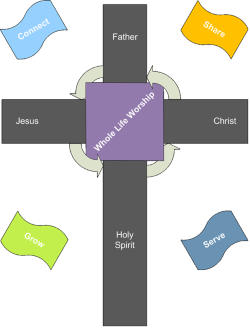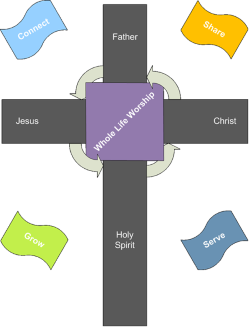What Are We Doing At Abundant Life? Connect Part 3
 Pastor Marty
Pastor Marty  Sunday, May 3, 2020 at 12:19PM
Sunday, May 3, 2020 at 12:19PM Romans 10:13-15; 1 Peter 3:12; 4:7; Romans 8:12-15; Romans 3:20-22; Jude 1:4, 20-21. This sermon was preached by Pastor Marty Bonner on Sunday, May 3, 2020.
Today, we will continue in our series on the purpose of the Church and for individual believers. Before we move to the second purpose, I want to look at four things that are not actually our purpose. Rather, they are the things that help us to accomplish the purpose. They are the simple actions of the life of faith in Jesus, and we do them because we believe that Jesus is the eternal Word of God, and our source of life. Each of these things will enable us to Connect to Jesus in whole-life worship, Grow to be like Jesus, Serve Jesus, and Share Jesus with others. If they are absent, then our ability in these areas will be impotent.
I need to hear and read the Word of God
Without God revealing Himself to us, we would be at a loss to discover His character and purpose. The Bible is the proven Word of God and no other religious book even comes close to comparing with it. In the Romans 10 passage, we see the importance of the Word of God. The Apostle Paul works backwards, or reverse-engineers, from the goal of a person who has been saved by Jesus in order to highlight what is needed. He impresses upon us the importance of hearing God’s Word for those who are unbelievers and lost. People who don’t know God typically don’t read the Word of God for themselves. Someone needs to bring it to them. However, once a person hears God’s Word, it becomes the spark that enables them to believe and then call upon the name of Jesus for salvation. Yet, our need for hearing and reading the Word of God doesn’t end once we are saved. We can’t do what God wants us to do if we don’t become a person of The Book.
We are going to see a pattern as we go through the purposes. The very things that help us to receive salvation also become the things that help us in our continuing discipleship. We will talk more about discipleship in our next purpose, but we must reject the idea that I can survive spiritually without becoming a student of God’s Word.
As we take time to internalize God’s Word through prayerful study, prayerful contemplation, and talking with other believers about it, we receive the Words of Life that give light to our minds and souls. People may ridicule the fact that it is an ancient document written by men from a strange culture. However, the words have proven themselves to be more than just the words of men about ancient issues. It has proven relevant in every age. Also, some believers may never say such a thing about the Bible, but in practice, they never really read it. It doesn’t seem practical to them. A Bibleless Christian is an oxymoron and will hardly accomplish any of these purposes.
Jesus is the Truth and the Wisdom of God. In an age that likes to talk about “my truth,” it is important to understand that this world is dying from a prevalence of “my truths” and a lack of real Truth. The biblical phrase for this is, “each one doing what is right in their own eyes.” Jesus is the blazing revelation of just who God is and what He wants from us. Any wisdom and truth that is other than him is a pretender, and is actually an anti-truth, anti-wisdom. Jesus is called The Word of God, so we cannot know him without actually being a student of the written Word of God, which reveals him to us.
This should not be a casual relationship. It is our daily manna that we need to go out and pick up as the Lord provides. I cannot lean upon yesterday’s manna, but must go after it each day. Without it, we will die on the vine in this wilderness-world where truth and wisdom are as rare as food in the desert.
Thus, always remember that our connection to Christ and to other believers is dependent upon the vigor of our interaction with the Bible. This needs to happen daily in private devotional times, and weekly in interaction with other believers, whether one-on-one, or in a group study.
I need to pray to God
By now, you have realized that I am not telling you anything new. Everybody knows that Christians are supposed to read the Bible and pray. However, prayer and reading the Bible are the kind of things that we intend to do, but never really get around to doing. It is imperative that we stop being lax in this area. It is not a matter of preference, but spiritual life and death.
Prayer is simple and yet can be more complex. When churches gather and sing songs of worship to the Lord, they are giving a special kind of prayer. We are spiritually addressing and praising our Father in heaven. I need not be in any particular place, nor need I be alone. The main thing is to speak to God at all times about the things that we encounter.
By the way, technically we are praying to the Father in the name of Jesus. He is our “access pass.” However, I don’t believe that God gets angry if we address Jesus in our prayers. Jesus is the Son of God, and the perfect representative of the Father to mankind. To pray to Him is to pray to the Father.
In Luke 18:1, the whole purpose of the parable that Jesus goes on to tell is to teach us that we should always pray. The story is about the persistent widow who wants justice from her adversary. In this, we find that even those who pray can become discouraged and give up praying like they used to do. However, we will not receive anything from God without giving ourselves to daily prayer. Second of all, prayer is not only about getting justice, or getting our material needs satisfied. It is a daily conversation that we have with our Lord about the things that we are learning. It is that wrestling of Jacob with the Angel of the Lord. I won’t let go unless you bless me! So, let us not kid ourselves. We will accomplish nothing of value without taking time to talk with God about it.
1 Peter 3:12 reminds us that God is watching all the time and He is listening as well. He is not a cosmic vending machine, but rather a personal being. This is a relationship of those who are sentient. Like any relationship, we can feel like He is not responding as quickly as we would like, or in the manner that we want. Yet, prayer begins with the simple act of faith that says, “I know He hears me, and I know He loves me.” Prayer without faith is a sad act of futility, but the prayer of faith of a righteous man is one of the most powerful things we can ever do.
In chapter 4 verse 7, Peter adds another layer to our prayers. He says that the end of all things is at hand; therefore, we should be serious and watchful in our prayers. In the context of Scripture, Peter means the end of all things, “as we know it,” or TEOTWAKI in the modern parlance. This world will not always continue going as it does today. This is definitely true in the historical arc of change, but it is also true in a greater sense. When the flood came, it ended one world and a whole new world took its place. The Second Coming of Jesus will be such an event.
It is easy for us to become inundated by the media and philosophies of this world. These are dominated by the spirit of this age, which works in opposition to Jesus. Prayer is a mental exercise, but it is far more than that. Peter sees our soul as something that needs to be watched over, like a shepherd watching over his sheep. It is through spiritual vigilance and conversations with the Lord that we keep our heart from growing weary of standing with him against the philosophies of this age. If you do not pray then this world will grind any faith you have to powder. The good news is that this world has a way of driving us to our knees. Don’t neglect this important part of our connection to Jesus.
I need to listen to the Holy Spirit
I could have treated this as part of prayer. Prayer is not intended to be a monologue, but a dialogue. Yes, God is not always so talkative, and yet, we must intentionally listen and watch for His responses.
In Romans 8:12-15, we find that it was the Holy Spirit that first led us to Christ and opened our eyes to his saving grace. It was our listening and responding in faith to the Holy Spirit that brought us through the door of salvation. This must not stop at salvation. We cannot pick up our cross and follow Jesus without listening to the Holy Spirit. Jesus is not physically on this earth. He speaks to us by His Spirit.
Now, the spirit of this world pulls us into gratifying our flesh. For some, it is sexual immorality, and for others it is substance abuse. Some go after spiritual experiences and spiritual power through any means necessary. The devil cares not what direction you go, as long as it is to gratify your fleshly desires. These always pull us away from Jesus and his purposes. Even believers will die if they quit following the Holy Spirit of God and simply follow their own heart.
This begs the question. To what am I listening? This is not always so easy to discern. Sometimes our flesh wants things that look religious and have a veneer of spirituality. Yet, at their heart they can be only about our pride and purpose.
Like the children of Israel in the wilderness, we have to move when the Spirit of God is moving. When He says it is time to repent, then we need to embrace repentance and do it. When He says it is time to help someone then we need to do it. This is a subjective area that takes time and is a relationship that needs to grow. So, I am not trying to strap a legalistic burden upon you, but rather to stir you up to the inheritance in front of you.
God’s Word is the guardrail to learning how to hear the Holy Spirit for ourselves. It was produced by men who listened to the Holy Spirit, and the Holy Spirit is not going to contradict Himself, but my flesh will contradict itself all day long. Having other believers around me is another guardrail that God can use to help us keep on the right path in this area. Ultimately, we must avoid pride and arrogance in this area.
In verse 15, Paul refers to the spirit of bondage. Our flesh always leads us into some kind of bondage. Yes, Americans have great freedoms, but in some ways, we are more in bondage then the slaves ever were. Learning to hear and recognize the Holy Spirit begins in reading the Words that He inspired. It is then forged in our prayers to God over time. Though we will never lack a need to grow in this area, steady faith will bring you to the place where you will recognize that same voice that led you to trust in Jesus in the first place.
I need to choose to live out the righteousness of Christ
It is not enough to hear the Word of God, and to hear the Holy Spirit. We must learn to exercise our faith by doing, by the actions that He puts before us. Do I pursue what is right in my own eyes, or do I listen to what God says is the righteous thing that I should be doing? For the believer in Jesus, there is only one answer. I want Jesus!
In Romans 3:20-22, Paul talks about the righteousness of Christ versus dead works. Sometimes people are confused about the New Testament teaching on works. Always remember that it is not works that are condemned (though sometimes it only uses that word). The condemnation is technically upon what is called “dead works.” Dead works are those things that my flesh does in order to achieve or earn salvation, whether from God or from this world. They are not born out of faith in the leading of the Holy Spirit, but in faith of my flesh that I can do this! The true believer has come to understand that none of us are able “to do it.” We cannot be righteous enough to deserve God’s love and presence. We are saved only by the grace of God. Yet, we are saved in order to live out the righteousness of Christ. Yes, it is the righteous works that He did which cover my sins. However, he also laid down a template for our discipleship. He has shown us how to become like the Father. The Holy Spirit will teach us how to say no to ungodliness, and yes to the things that Jesus wants us to do (that reflect the Father’s image). The things we do in response to the Spirit of God give life and are true righteousness. Anything I do out of an attempt to force God to give me what I want is a dead work. So, Christians ought not to put down seeking to live set apart for the Lord, rather than for the world.
In our last passage, Jude 1:4, 20-21, we see the apostle’s concern for how we live. The early Church had its fair share of false teachers, false prophets, and false apostles. They tended towards two errors. Either they promoted legalistic approaches to God, or they promoted using the grace of God as a license for immorality. Jude warns believers that those who do so “deny the Lord.” If you have truly received the grace of Jesus then you won’t easily choose to sin. My sin is what nailed Jesus to the cross. My sin is what led to his gruesome death. How can I continue to hold on to it? Jesus did not go to the cross because he was pleasing his flesh, and your flesh will not lead you towards Jesus. To embrace sin is to let go of Jesus, period. Be quick to repent of such an attitude and ask the Lord to cleanse you from such a horrible persuasion.
We could use the word “obedience” here, but that word falls short of what God intends for us. Little kids need to obey because they don’t understand, even can’t. However, adults need to believe, to have faith, to agree. My heart needs to valiantly rise up to the challenge of the Holy Spirit to march on. Yes, Lord, I hear you. I will follow. It is the response of a person who has seen that they not only need Jesus, but that they also love who and what he is; and we want to be like him.
Grace is not a license for immorality; it is the gift of transformation. God graciously puts His Spirit in your life to enable you not only to connect to Jesus, but also to have His abundant Life pouring into you and creating a life-long transformation.
May we give ourselves to studying God’s Word, praying to God and worshipping Him, hearing the call of the Holy Spirit, and taking those bold steps of faith to follow Him. There is no other way to life!
 Email Article |
Email Article |  Print Article | | tagged
Print Article | | tagged  Bible,
Bible,  Connection,
Connection,  Courage,
Courage,  Faith,
Faith,  God’s Word,
God’s Word,  Holy Spirit,
Holy Spirit,  Listening,
Listening,  Obedience,
Obedience,  Prayer,
Prayer,  Purpose
Purpose 




